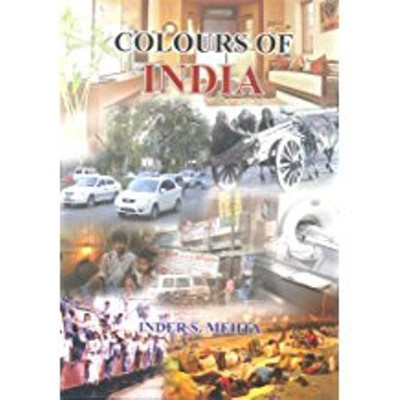Colours of India 2008 Edition(English, Paperback, Inder S. Mehta)
Quick Overview
Product Price Comparison
The late JRD Tata was not only a genius, but a great visionary who realized that for India to be truly a great and prosperous country, her people must first be happy. JRD's vision of happiness was one where people were free of prejudices, crime and corruption, where everyone had an opportunity to receive good education, enjoy good health and earn a decent living. Unfortunately, this is not what India is today. It is everything but what JRD had envisioned. The author in this book takes a fresh look at India of today and analyzes the ills that afflict the country. The book attempts to portray the stark disparities that exist between various sections and classes in India of JRD's dreams. The author is pained to find that even after 60 years of independence and despite the illustrious heritage; disease, hunger, poverty, illiteracy, caste and religious prejudices continue to haunt the Indian people. The entire country and its economy have been taken hostage by the self-centered politicians, corrupt bureaucracy and sluggish judiciary. The vote-bank politics is cutting at the roots of the meaningful democracy and is responsible for all the ills that infest the Indian system of governance. The author explains what must be done to change it all, and how to make India and its people truly happy and prosperous. About Author : Inder Mehta studied at St. Stephen's College, New Delhi and obtained his Masters degree from the University of Delhi. He also holds a Masters degree in Business Administration from Marquette University, Milwaukee, Wisconsin. Inder worked for several multinational companies in the USA. As Vice President International for Regal Ware, Inc., he traveled far and wide, to nearly fifty countries, experiencing different cultures, traditions and beliefs. He lives in the USA. Contents : Acknowledgements Foreword Author's Note Prologue: An Open Letter to J.R.D. Tata Chapter 1 - Roads, Court Cases and Sacred Cows Chapter 2 - Delhi, Mumbai and Shanghai Chapter 3 - Power Generation, Inaugurations and Commandoes Chapter 4 - Madam Justice and the Justice System Chapter 5 - Press, Media, Paparazzi and Toll Booths Chapter 6 - Equality, Law and Corruption Chapter 7 - Dichotomy of an Economic Superpower Chapter 8 - Reservation and Quotas Chapter 9 - Democracy Chapter 10 - Civil Society Chapter 11 - Reincarnated Populist Slogan: 'Garibi Hatao' Chapter 12 - What's In a Name: Mumbai, Bengaluru, Kolkata Epilogue Index


